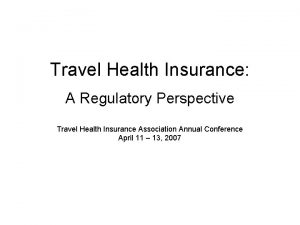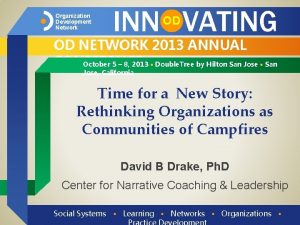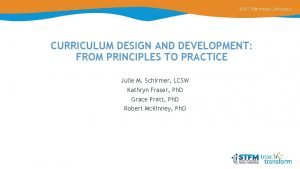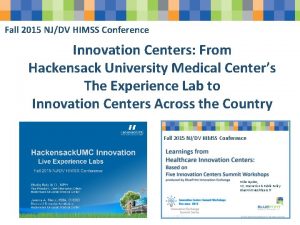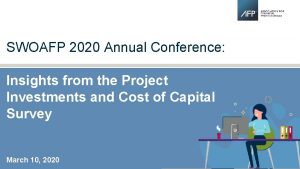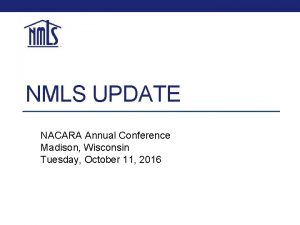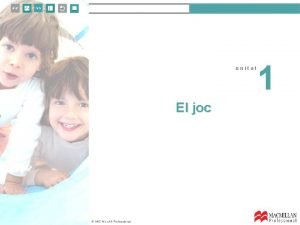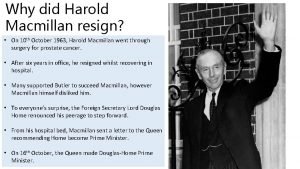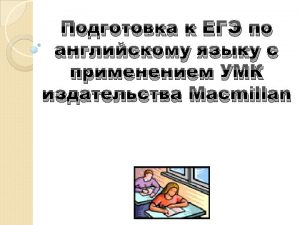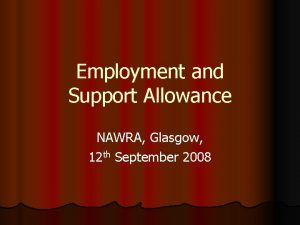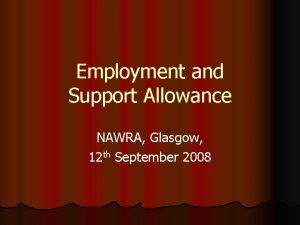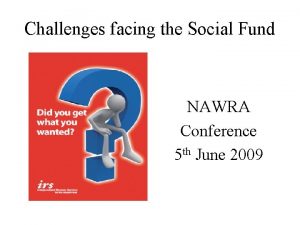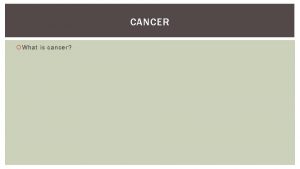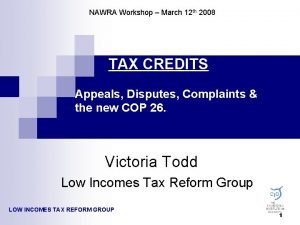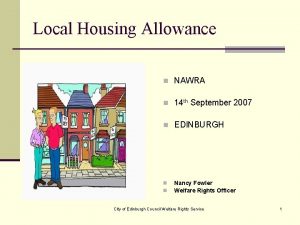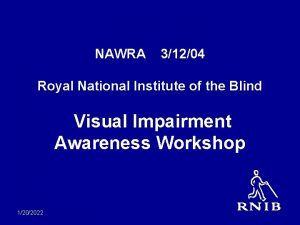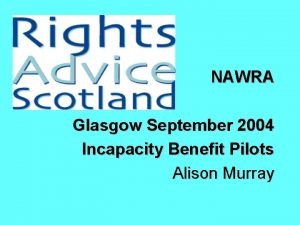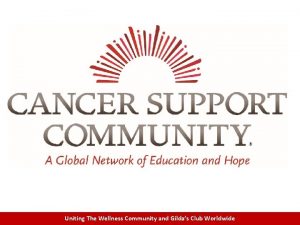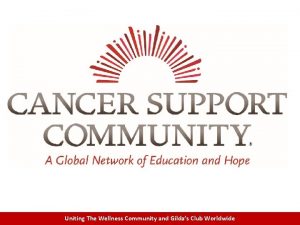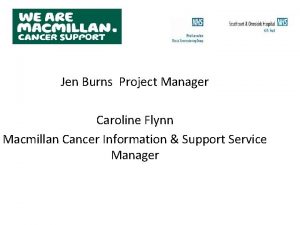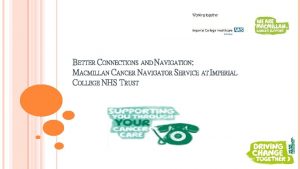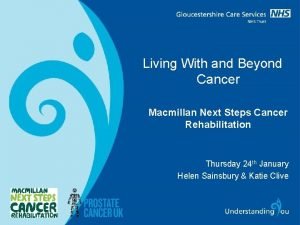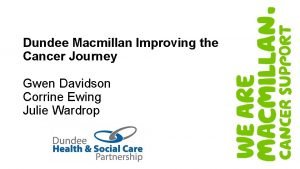Macmillan Cancer Support NAWRA Annual Conference Friday 12


















- Slides: 18

Macmillan Cancer Support NAWRA Annual Conference Friday 12 th September 2008 Glasgow City Chambers The need for patient support Tommy Gorman Macmillan Cancer Support

1. 2. 3. 4. 5. 6. Missing millions Increasing cancer burden Living with cancer Macmillan benefits network The challenge The solution

Macmillan research: The missing millions • More than £ 126. 5 million in disability benefits went unclaimed by terminally ill cancer patients throughout Great Britain in one year • This amounts to 54% (or 83, 000) patients who are diagnosed with a terminal cancer and do not receive the benefits and allowances they are entitled to claim • Scotland has the lowest claim rate in the UK and 64% (or 10, 000) cancer patients with a terminal illness lost out on £ 15 million in unclaimed benefits

Increasing cancer incidence (1) • In the past 25 years overall cancer incidence has increased by 24% • Forty per cent of people will suffer from cancer in their lifetime • In Scotland diagnosis of some common cancer types are expected to increase by 50%, compared to levels experienced in the nineteennineties • By 2011 there will be over 31, 000 cases of cancer diagnosed each year compared with over 26, 000 per year between 1996 and the year two thousand.

Increasing cancer incidence (2) • There will be more than 1, 000 cases of malignant melanoma each year compared to current levels of 600 • Cancer deaths in Scotland are 15 per cent higher than the UK as a whole • Male cancer diagnosis in Scotland 446 per 100, 000 compared to the UK figure of 402 per 100, 000 • Female cancer diagnosis in Scotland 379 per 100, 000 compared to the UK figure of 343 per 100, 000

The female cancer burden • Cancer Research UK has recently expressed concern at the increased incidence of some cancer types among women • Ovarian & cervical cancer rates among older women (60– 79) has risen significantly • Womb cancer affects around 6, 000 women in the UK each year and it is responsible for about 1, 500 deaths annually • The rate of cases of some cancer types among women aged from 60 to 79 has risen by more than thirty percent in less than ten years • Most worryingly breast cancer is forecasted to rise by 23 percent in Scotland in the next decade

Respiratory illness 1. An estimated 24 million consultations with GPs were for respiratory disease 2. Nearly one in five males and one in four females consulted a GP for a respiratory complaint 3. More than 62 million prescriptions were used in the prevention and treatment of respiratory disease 4. An estimated one million hospital admissions were for respiratory disease 5. In 2004 over 27, 000 people died from Chronic Obstructive Pulmonary Disease

Occupational lung disease • In 2002, there were 2, 333 deaths from occupational lung disease in Great Britain • More than 75% of these deaths were from mesothelioma, a type of cancer caused by inhalation of asbestos dust • The number of deaths due to occupational lung disease has been rising rapidly since the early 1990 s • This has risen by 15% between 1998 and 2004 • This is mostly due to the large increase in mesothelioma deaths from 1, 097 in 1992 to 1, 862 in 2002, an increase of 70% British Thoracic Society

Living with cancer • More people are living with cancer than ever before • It should not be forgotten that large numbers of cancer patients who are not terminally ill experience serious financial problems as a result of their illness • Each year in Scotland millions of pounds in benefits and allowances go unclaimed by cancer patients • Total unclaimed benefits by Scottish cancer patients estimated at around £ 50 million each year

Financial matters • For people affected by cancer financial concerns are second only to physical pain as a significant cause of stress • For many patients a cancer diagnosis results in a drop in income • Daily living costs are likely to increase due to a variety of factors • Many cancer patients in need don’t receive the benefits they are entitled to because they don’t know WHAT to claim or HOW to apply

Macmillan Patient Grants • Available for cancer patients on low income • Can help with travel, telephone, heating costs • New clothing due to weight changes • Other items in special circumstances • Simple and effective method of support for cancer patients • Claims submitted and decisions made very quickly • 139 awards in excess of £ 50, 000 in local community

Patient needs In one local project issues included in Macmillan Patient Grants applications were: • New clothing 55% • New bedding 83% • Travel costs 9% • Heating costs 49% • Other 39%

Fuel poverty • Poor heating causes severe discomfort to many cancer patients who are confined to their own homes for long periods and are very sensitive to low temperatures • In project around 50% of Macmillan Patient Grants awarded to assist with increased fuel costs incurred by cancer patients • Awards are considered and distributed with minimal form filling usually within two weeks • This support ensures that the immediate fuel poverty issue is promptly addressed for those on the lowest incomes at time of greatest need • Average amount awarded to assist with fuel costs around £ 300

Case Study 1 Patient male aged 34 years was working full-time. Diagnosed as suffering from Non Hodgkin’s Lymphoma. Circumstances monitored until wages ceased. Project staff arranged for a home visit; at this visit the appropriate forms were completed. A Disability Living Allowance application was made and the patient was advised that it could take up to 12 weeks for a decision on his claim. Incapacity Benefit, Income Support and Council Tax Benefit applications were also completed for patient. Patient income after project intervention is set out below; Disability Living Allowance: Income Support: Incapacity Benefit: Council Tax Benefit: Patient’s weekly increase: £ 45. 00 £ 11. 90 £ 95. 00 £ 10. 23 £ 162. 13 Macmillan Patient Grant In addition to weekly increase Macmillan Patient Grant application successful and £ 400 for a new cooker and contribution towards fuel costs were awarded. Other issues Blue Badge application was made to enable the patient with parking at hospital and while attending GP appointments. A referral was made to West Dunbartonshire Council, Social Work Services for an occupational therapy assessment. Return to work Client able to return to work on a phased basis. Weekly wage on return to work £ 202. 75; project team ensured he retained his Disability Living Allowance award of £ 45. 00 which he continues to receive together with his wages. This patient was clear that advice & assistance received from the project improved his quality of life by lessening the financial pressure he was placed under following diagnosis and assisting return to his employment.

Case Study 2 Patient diagnosed with throat cancer aged 79 undergoing Chemotherapy and Radiotherapy treatments; wife 73 years old. Patient requires frequent help with his care needs both day and night. Income details previous to the project intervention were as follows: State Retirement Pension: Pension Credit Guarantee: Housing Benefit: Council Tax Benefit: Spouse income: Couple’s joint income: £ 123. 25 p/w £ 19. 72 p/w £ 47. 33 p/w £ 16. 39 p/w £ 159. 71 p/w £ 302. 68 p/w Benefit claim forms and Macmillan Patient Grant applications successfully completed and agencies contacted to increase their Housing Benefit and Council Tax Benefit amounts. State Retirement Pension: £ 123. 25 p/w Pension Credit Guarantee: £ 110. 19 p/w (2 x carer’s premium & 2 x severe disability premiums) Pension Credit savings: £ 25. 26 p/w Attendance Allowance: £ 64. 50 p/w Housing Benefit: £ 52. 71 p/w Council Tax Benefit: £ 18. 01 p/w Couple’s new joint income: £ 482. 94 p/w Couple’s weekly increase: £ 180. 26 p/w Macmillan Patient Grant of £ 400. 00 awarded to assist with replacement clothing, bedding and a contribution to fuel costs.

Case Study 3 Patient is aged 52 and lives alone. He has been diagnosed with squamous cell carcinoma of the tongue and the referral to the benefits project was received from the head and neck CNS at Gartnavel Hospital. The patient had some capital from the sale of a house. Patient weekly income prior to project intervention was £ 57. 65 Incapacity Benefit. Macmillan Patient Grant and DLA applications were successful. When the patient’s capital had reduced; a claim was made on his behalf for Income Support to include the disability premium, enhanced disability premium and severe disability premiums. Housing Benefit and Council Tax Benefit, were both paid in full * Note high rent amount of £ 80. 07 per week. Disability Living Allowance: Housing Benefit: Council Tax Benefit: Incapacity Benefit: Income Support: Patient’s new weekly income : Patient’s weekly increase: £ 109. 50 p/w £ 80. 07 p/w £ 16. 36 p/w £ 70. 05 p/w £ 70. 60 p/w £ 346. 58 p/w £ 288. 93 p/w Macmillan Patient Grant In addition to weekly increase a Macmillan Patient Grant of £ 450. 00 was awarded to assist with replacement clothing, bedding and a contribution to fuel costs.

The Challenge • In parallel with significant demographic change we face the significant challenge of supporting an increasingly ageing population who will experience a cancer diagnosis • We have a national benefits system which does not effectively address the needs of this growing section of society • Currently some cancer types do not fit the disability benefits rules, putting patients at risk of financial hardship • How do we provide effective and responsive advice, advocacy and benefits support for people who are affected by cancer and not receiving the financial support to which they are entitled?

The solution • Build a network of cancer-specific advisors who are trained to understand the impact of a cancer diagnosis on the need for financial support • Utilise the expertise, knowledge & networks available within local government and the voluntary sector • Develop robust protocols for identification, referral and delivery of advice for everyone who is affected by a cancer diagnosis • Embed these practices within clinical processes to ensure that financial status becomes a routine part of EVERY patient’s cancer journey
 Travel health insurance association annual conference
Travel health insurance association annual conference Organization development network annual conference
Organization development network annual conference Stfm abstract submission
Stfm abstract submission Gie annual conference
Gie annual conference Gcyf 2011 annual conference
Gcyf 2011 annual conference Problemitize
Problemitize Stfm annual conference
Stfm annual conference Annual fuze conference
Annual fuze conference Njdv
Njdv Hepi annual conference
Hepi annual conference Annual conference on pbfeam
Annual conference on pbfeam Https //bit.ly2v
Https //bit.ly2v Iowa league of cities annual conference
Iowa league of cities annual conference Nmls annual conference 2019
Nmls annual conference 2019 Macmillan profesional
Macmillan profesional Adams and miles llp
Adams and miles llp Electricidad basica macmillan
Electricidad basica macmillan Macmillan professional
Macmillan professional Why did macmillan resign
Why did macmillan resign
